She Business
Joyce Akinyi Convicted: Heroin Smuggling Case Exposed

: Kenyan businesswoman Joyce Akinyi faces life imprisonment after being found
guilty of smuggling heroin worth US$ 34,483. Her history with crime has now
unravelled.
Joyce Teresia Akinyi’s story is one of dramatic highs and lows—rising from a successful
businesswoman to being convicted of a large-scale heroin smuggling operation.
With ties to international criminal networks, high-profile relationships, and repeated run-
ins with the law, Akinyi’s life has been marked by controversy and legal battles.
THE HIGH LIFE: BUSINESS AND INFLUENCE
Akinyi first gained prominence as the upscale Deep West Resort owner in Lang’ata,
Nairobi. Known for her affluent lifestyle, she mingled with Kenya’s elite and maintained
significant business interests.
However, behind the glamorous facade lay a darker world of alleged criminal activity.
Her personal life was equally turbulent. In 1998, she met Nigerian businessman Anthony Chinedu, and the couple had two children before formalising their union.
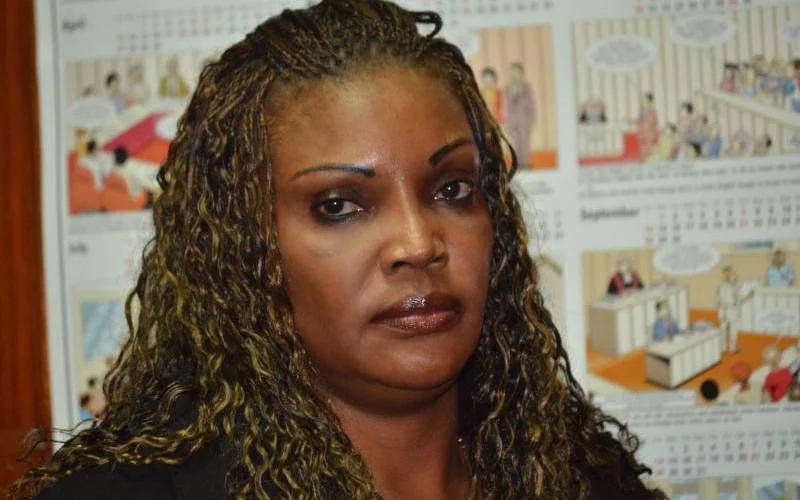
Their relationship was rocky, marked by numerous arrests on drug trafficking charges.
In 2013, Chinedu was deported from Kenya after authorities seized drugs in his
possession, a move that further exposed Akinyi to public scrutiny.
A HISTORY OF LEGAL TROUBLES
Over the years, Akinyi faced repeated allegations of drug trafficking. Her name became
prominent in 2008 when she was arrested in New Delhi, India, alongside former
Budalang’i MP Raphael Wanjala.
Authorities detained the pair with undeclared cash worth Sh7.59 million, suspected to
be linked to drug deals. Although released after intervention by the Kenyan government, the incident marked the start of a string of legal troubles for Akinyi.
In 2013, she and Wanjala were arrested again on the Nairobi-Namanga highway with a
suspicious white powder. Although they claimed it was corn flour, suspicions persisted,
and Akinyi’s criminal associations deepened.
THE TURNING POINT: CONVICTION FOR HERION SMUGGLING
Akinyi’s criminal activities reached a dramatic conclusion in 2019 when a police raid on
Deep West Resort uncovered 2kg of heroin worth Sh5 million hidden in a shoe rack.
The Anti-Narcotics Directorate linked the operation to an international smuggling
network coordinated by Akinyi.
The Jomo Kenyatta International Airport Tribunal found Akinyi guilty under Article
4(a) of the Narcotic Drugs and Psychotropic Substances Control Act, which
mandates life imprisonment for drug trafficking.
The court heard compelling evidence, including photographs of heroin wrapped in white
tape, voice recordings coordinating smuggling activities, and the discovery of a Tabita
Digital Scale used to weigh drugs.
Akinyi’s co-defendants, Paulin Kalala Musankinshay and Peres Adhiambo, were
similarly implicated. Evidence also revealed that Akinyi used multiple fake passports, including a Congolese passport in the names of “Mape Marline Kambura” and “Raha Eveline
Kambere,” enabling her to operate under different aliases.
FINANCIAL CRIMES AND ASSET RECOVERY
Beyond drug trafficking, Akinyi’s wealth came under scrutiny. In 2021, she lost two
luxury vehicles worth Sh20 million to the State, deemed proceeds of crime.
Investigations by the Asset Recovery Agency revealed that Akinyi deposited
suspiciously large sums ranging from Sh60,000 to Sh20 million into various bank
accounts. Her real estate investments—villas built and rented out—further indicated
illicit income sources.
THE END OF THE ROAD
On December 10, 2024, Akinyi faces sentencing, which could include life
imprisonment and a Sh5 million fine. Her fall from grace highlights the dangers of
unchecked ambition and illegal pursuits. Magistrate Njeri Thuku, who presided over the
case, dismissed Akinyi’s defence that the drugs were planted by her estranged husband
Chinedu, calling it baseless.
CONCLUSION
From her meteoric rise as a business mogul to her conviction as a drug trafficker, Joyce
Akinyi’s life is a cautionary tale of how power, wealth, and crime can intertwine.
Her story also underscores Kenya’s ongoing battle with drug trafficking and the far-reaching
consequences of organised crime. For Akinyi, the glitz and glamour of her former life
have now given way to the stark reality of justice.
Nb: Exchange rate 1 USD = 145 Ksh
She Business
Bethlehem Tilahun Alemu: From Ethiopian Artisan to Global Icon

: Discover how Bethlehem Tilahun Alemu built SoleRebels into a global,
sustainable footwear brand, overcoming challenges and transforming Ethiopian
craftsmanship.
Bethlehem Tilahun Alemu’s story begins in Zenabwork, a modest village on the outskirts
of Addis Ababa, Ethiopia. Growing up, she watched her community struggle with unemployment and poverty, despite a rich heritage of artisanal skills that remained largely untapped.
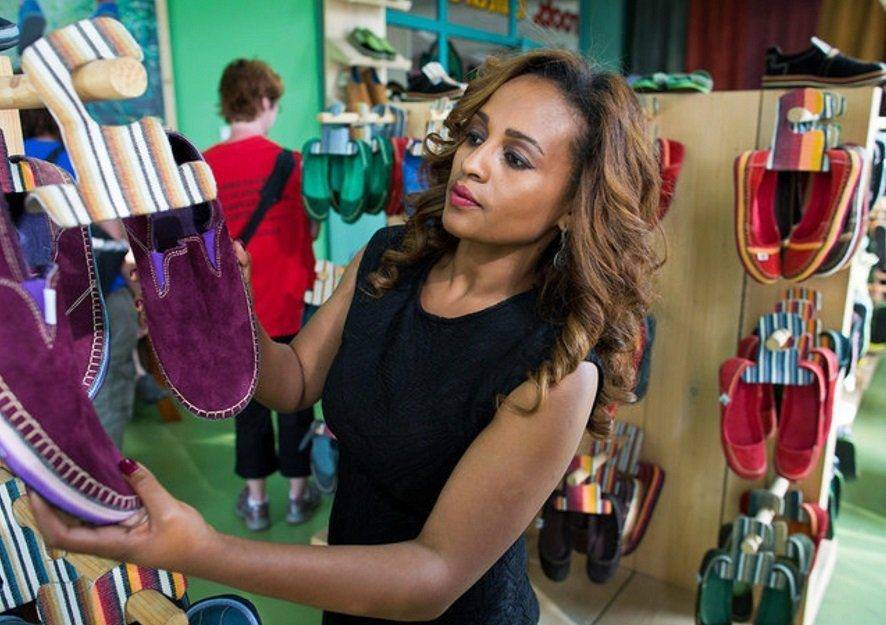
Fueled by determination and a desire to transform her surroundings, Bethlehem
embarked on a journey that would redefine African entrepreneurship and put Ethiopia
on the global map.
Her creation, SoleRebels, isn’t just a footwear brand. It’s a movement—an embodiment
of sustainability, culture, and empowerment.
A DREAM WOVEN WITH TRADITION
In 2005, Bethlehem founded SoleRebels with a simple yet powerful idea: to turn
Ethiopia’s rich artisanal craftsmanship into eco-friendly, globally competitive footwear.
Inspired by traditional “selate” shoes—made from recycled tyres—she envisioned a
brand that blended cultural authenticity with modern design.
She recruited local artisans, many of whom were unemployed, and encouraged them to
innovate while preserving traditional techniques.
Every pair of shoes was a masterpiece, crafted from hand-spun cotton, organic
materials, and repurposed car tyres. Bethlehem’s concept was groundbreaking: a product that told a story while making a global impact.
STARTING FROM SCRATCH
Like many entrepreneurs, Bethlehem’s initial challenge was capital.
With no access to bank loans or large investors, she relied on personal savings and
modest contributions from her family.
Slowly but surely, she built her business, reinvesting profits into training workers and
improving production tools. International grants and initiatives like the SEED Initiative later recognized the potential of her venture, providing additional support.

The early days weren’t easy. Artisans lacked modern tools, and accessing raw
materials was an uphill battle. But Bethlehem, known for her tenacity, tackled these challenges head-on. She developed partnerships with local suppliers to ensure a consistent supply of quality materials and invested in upskilling her workforce.
Breaking into the global market presented another hurdle. Competing against established brands seemed daunting, but Bethlehem found her edge: sustainability and ethical production.
In an era when consumers were becoming eco-conscious, SoleRebels’ ethos of fair wages, recycled materials, and cultural storytelling resonated deeply.
BUILDING A GLOBAL EMPIRE
Fast forward to today, and SoleRebels has a presence in over 30 countries, with
flagship stores in cities like San Francisco, Tokyo, and Barcelona.
It is also the first African footwear brand to be certified by the World Fair Trade
Organization (WFTO)—a testament to Bethlehem’s commitment to doing business the
right way.
Her company directly and indirectly employs over 1,200 people, making it one of
Ethiopia’s largest employers in the artisan sector.
Workers earn more than three times the industry average, a policy Bethlehem takes
immense pride in. “When we pay people well, we don’t just change lives—we transform
communities,” she says.
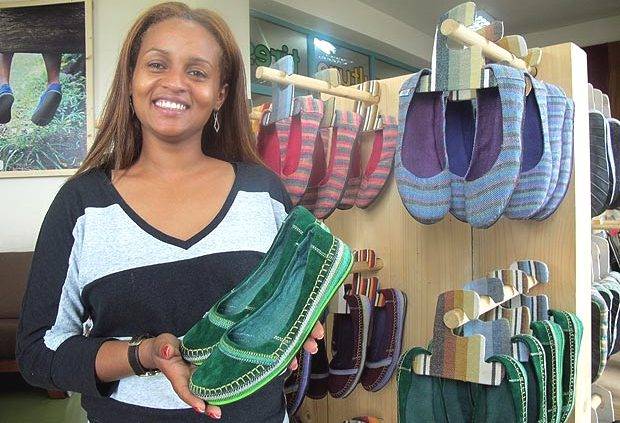
MENTORS AND INSPIRATIONS
Bethlehem often credits her late grandfather, a farmer and community leader, as her
greatest mentor.
His work ethic and deep belief in the power of local communities shaped her vision. She
also draws inspiration from global leaders, including Ethiopian Prime Minister Abiy
Ahmed, whose focus on innovation and economic growth aligns with her goals.
RISING ABOVE CHALLENGES
Bethlehem’s entrepreneurial journey has been marked by resilience. When production
scaled up, she faced supply chain disruptions that threatened deadlines. Her solution?
Cultivate long-term relationships with reliable local suppliers and diversify material
sources.
Entering new markets came with its own set of obstacles. Competing against
established brands requires a unique value proposition.
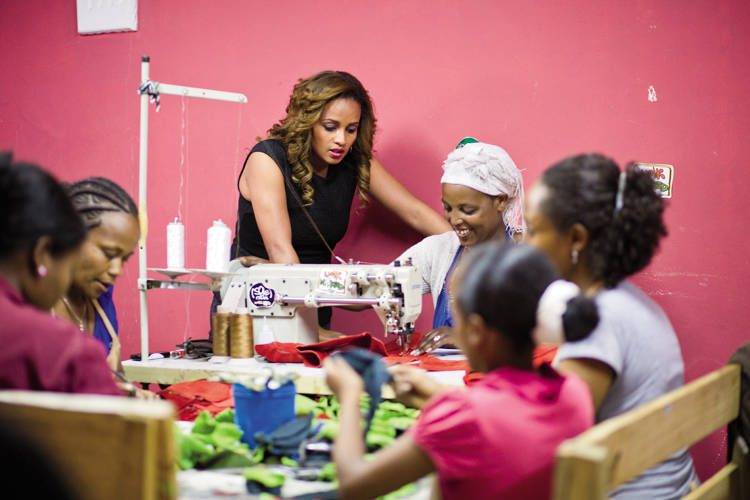
SoleRebels offered more than shoes—it offered a story: a product steeped in Ethiopian
culture, made sustainably, and crafted ethically.
VISION FOR THE FUTURE
Bethlehem isn’t slowing down. Her plans include:
- ● Expanding SoleRebels’ retail presence in Europe and Asia.
- ● Introducing sustainable clothing lines.
- ● Partnering with global brands to promote eco-friendly production in Africa.
Beyond SoleRebels, Bethlehem has a broader mission: to inspire a new narrative for
African entrepreneurship. She wants to show the world that Africa isn’t just a consumer
market but a hub for innovation and excellence.
CONCLUSION: WALKING THE TALK
Bethlehem Tilahun Alemu has redefined what it means to be an entrepreneur. From
Zenabwork’s dirt roads to the global stage, she has shown that success doesn’t come
from resources alone—it comes from vision, grit, and a deep connection to one’s roots.
With SoleRebels, Bethlehem has not only created a thriving business but a model for
how sustainable, ethical enterprises can transform communities. As she continues to
dream big, her footsteps pave the way for the next generation of African changemakers.
She Business
How Margaret Nyamumbo Built Kahawa 1893 from the Ground Up
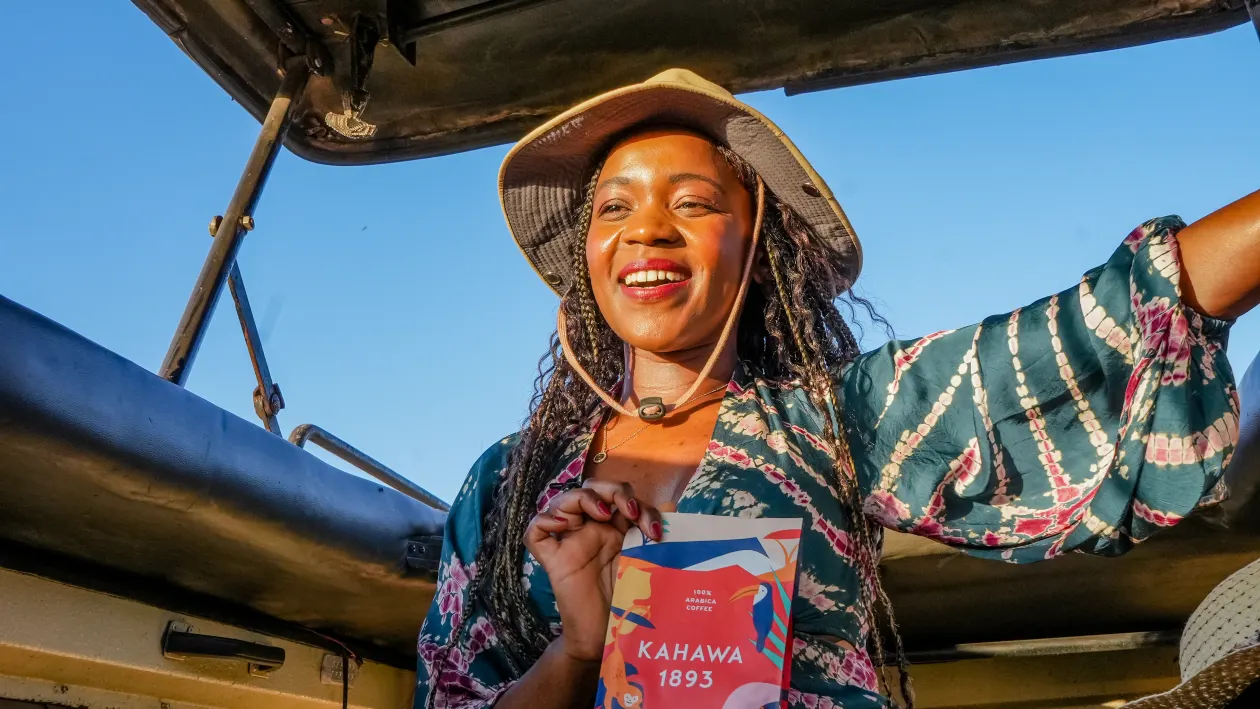
: Discover Margaret Nyamumbo’s journey from Kenya to the U.S. and how she
built Kahawa 1893 to empower women coffee farmers, achieving business
success and social impact
Early Life and Education: Pursuing Global Opportunities
Margaret Nyamumbo’s entrepreneurial journey began in Kenya, where she grew up on a coffee
farm. However, she moved to the U.S., a decision that significantly shaped her path.
In 2000, she travelled to Smith College, a prestigious liberal arts institution in Massachusetts,
to study economics.
Her desire to study abroad stemmed from the limited educational opportunities available for
women in Kenya at the time. As she later explained, her family encouraged her decision, viewing it as a way to give her the best opportunities for success.
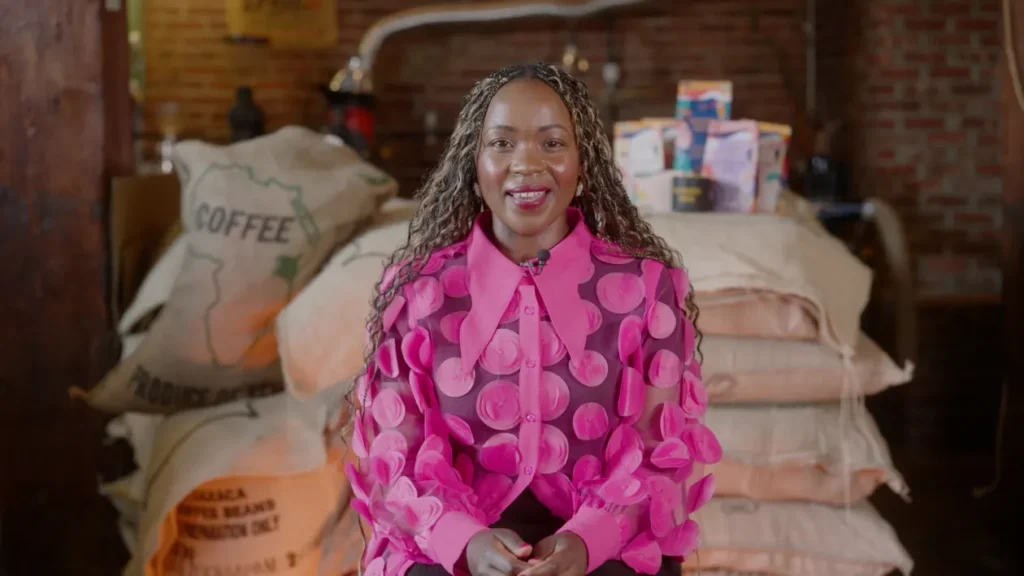
After earning her degree from Smith College, Nyamumbo pursued an MBA at the Wharton
School of the University of Pennsylvania, known for its rigorous business programs.
This solidified her foundation for a future in business, although it was the allure of her roots and a passion for coffee that eventually led her back to entrepreneurship.
From Corporate Work to Entrepreneurship: Embracing Coffee Culture
After completing her studies, Nyamumbo worked in investment banking and consulting, but the world of corporate finance didn’t fully satisfy her ambitions.
It was her return to the coffee industry, deeply connected to her Kenyan heritage, that drove
her entrepreneurial leap. With a vision to support East African coffee farmers, particularly women, Nyamumbo founded Kahawa 1893 in 2018, a coffee brand dedicated to highlighting Kenya’s coffee culture while mpowering local farmers.
The name “Kahawa” is the Swahili word for coffee, while “1893” marks the year when coffee
was first commercially grown in Kenya, grounding her brand in historical significance.
Through Kahawa 1893, Nyamumbo aimed to bring a new approach to the coffee business, one
that not only celebrated East African coffee but also created fair wages for farmers.
Building a Brand with Purpose: Empowering Farmers
Nyamumbo’s vision for Kahawa 1893 went beyond just selling coffee.
She wanted to create a direct impact on the lives of the farmers growing the coffee beans.
The brand’s model incorporated a system where customers could tip the farmers directly via a
QR code found on the coffee bags.
This innovation set the company apart from competitors and positioned it as a socially
responsible business that directly benefited those involved in the production process.
In 2021, Kahawa 1893 hit a major milestone, getting its coffee stocked in Trader Joe’s—the
first Black- and woman-owned coffee brand to be featured there.
This breakthrough moment was significant for Nyamumbo, marking the recognition of her hard work and her commitment to uplifting local farmers.
Overcoming Challenges: What It Takes to Succeed
Despite the challenges of entering a highly competitive market, Nyamumbo’s determination
never wavered. In a 2022 interview with Forbes, she shared her thoughts on what it takes to be a successful entrepreneur.
“You have to be able to take the punches and keep moving,” she said. Her advice reflects the
reality of entrepreneurship: persistence, resilience, and a willingness to learn from failure are
crucial for success.
Nyamumbo also emphasised the importance of passion. “You’ve got to love what you do, or you won’t have the energy to push through the tough times,” she said.
These values have guided her journey, driving Kahawa 1893 to not only succeed but also to
change the way the coffee industry operates, particularly about fair trade and community
empowerment.
The Future of Kahawa 1893: Expanding Horizons
With her success on platforms like Shark Tank and continued global distribution, Nyamumbo’s
Kahawa 1893 is poised for growth.

Her brand continues to expand its reach, and the emphasis on ethical sourcing, community
impact, and high-quality coffee will likely remain at the heart of her business model as she looks to further innovate in the global coffee market.
Through Kahawa 1893, Nyamumbo has shown that business success is not just about
profits—it’s about purpose, people, and passion.
She Business
Chebet Ng’ok: Founder of Harriet Botanicals, Empowering Wellness
Harriet Botanicals embodies Chebet Ng’ok’s mission to make indigenous wellness accessible to everyone. Her journey shows how personal struggles can spark entrepreneurial success. “I never imagined my pain would bring me here,” she reflects. “But now, I’m proud to help others live healthier, pain-free lives.” Chebet’s story is one of resilience, innovation, and staying connected to her heritage—valuable lessons for any aspiring entrepreneur.
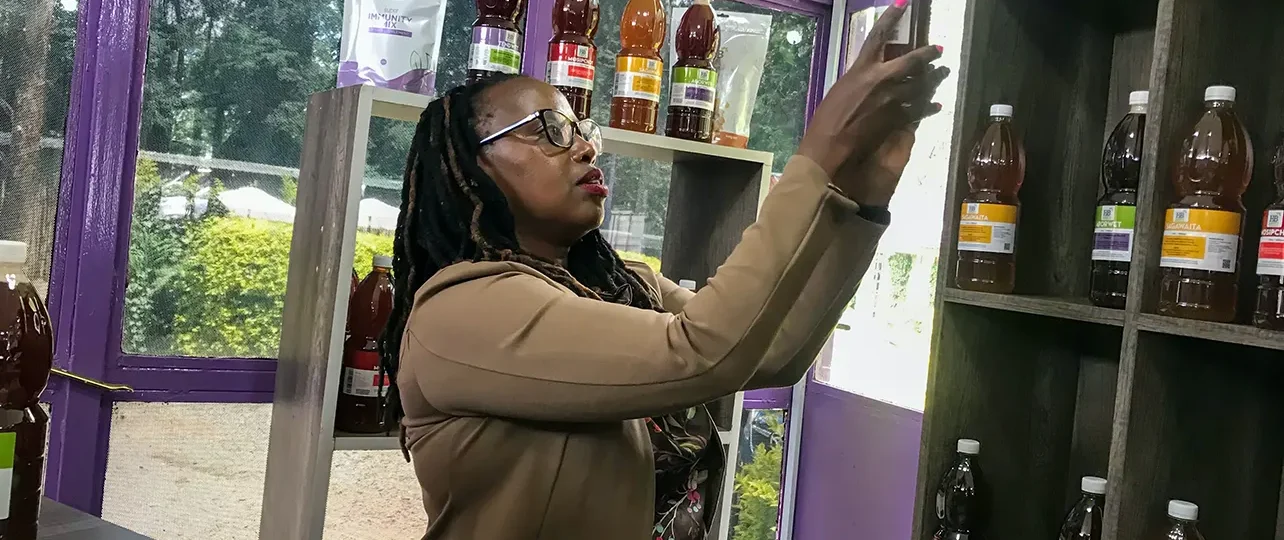
Discover how Chebet Ng’ok’s Harriet Botanicals uses indigenous herbs to transform reproductive health, helping women and men live pain-free, healthy lives.
Chebet Ng’ok, the Founder and CEO of Harriet Botanicals, took a deeply personal challenge and turned it into a thriving business, bringing indigenous Kenyan remedies to the forefront of the wellness industry.
What started as a search for relief from severe menstrual pain led Chebet to discover the healing power of local herbs.
Today, her company is empowering women and men alike through natural products while promoting better reproductive health.
From Financial Powerhouse to Entrepreneur
Chebet’s journey into entrepreneurship was far from typical.
A highly successful financial manager and consultant, she spent over 15 years living in London, where she obtained an LLB in Law with a concentration in Commercial Law from the London School of Economics and an LLM in International Banking and Finance.
Her illustrious career saw her work with some of the world’s largest financial institutions, including JPMorgan Chase, the UK Financial Services Authority, and Goldman Sachs. She even held positions as an independent consultant and an East Africa Partner at Dwyka Projects and Equinox Global Consultants.
However, behind her professional success, Chebet was grappling with debilitating menstrual pain that impacted her life and career.
“When I finished my education and started working, I had a serious challenge with my menstruation—a lot of pain, agony, painkillers, and frequent visits to doctors and gynecologists,” she explained in a 2021 interview. Desperate for relief, she tried everything from juice fasts and yoga to various painkillers, but nothing seemed to work.
Discovering Indigenous Remedies
It wasn’t until Chebet returned to Kenya that she discovered the transformative power of indigenous herbs.
Her journey into alternative medicine began with a recommendation from a family member.
A herbalist uncle from Webuye gave her a traditional remedy that, for the first time, alleviated some of her pain. Later, at her father’s funeral, a woman introduced her to Kipsigis herbs, which provided the first completely painless menstrual cycle Chebet had experienced in years.
This revelation inspired her to research further into indigenous remedies from the Keiyo, Marakwet, and Kipsigis communities.
“When I experienced a painless period for the first time in my life, I knew I had stumbled upon something truly powerful,” Chebet recalls. She began sharing the herbs with friends, one of whom was about to undergo a hysterectomy due to severe menstrual pain. The success stories spread quickly, with Chebet’s social circles buzzing about the benefits of these natural remedies.
Filling a Void in Kenya’s Wellness Market
Harriet Botanicals was officially launched in 2017 to formalize the distribution of these indigenous remedies, focusing initially on women’s reproductive health.
“We realized there was a huge gap in the market for locally sourced, natural solutions to common health issues like menstrual pain, infertility, and digestion challenges,” says Chebet.
As word of mouth spread and demand grew, Harriet Botanicals expanded its product line to cater to both men and women, offering remedies for issues like low libido and immune support.
Chebet made it her mission to ensure that these products were accessible to all Kenyans, opening outlets in major cities and towns across the country.
Overcoming Challenges and Building a Business
Starting Harriet Botanicals was not without its challenges. Despite her background in finance, Chebet faced an entirely new set of hurdles in the health and wellness sector.
“Convincing people to trust indigenous remedies was tough. Many believed that imported products were more effective,” she explained.
Funding was another major obstacle. Chebet initially relied on personal savings and small contributions from family and friends. She didn’t have access to large-scale investment, but through determination and a commitment to quality, Harriet Botanicals slowly gained a loyal customer base.
“I believed in the power of the product, and I knew that if we kept reinvesting back into the business, we could grow sustainably,” she said.
Lessons for Aspiring Entrepreneurs
Reflecting on her entrepreneurial journey, Chebet shares some valuable lessons for others looking to start their own businesses.
“First, you have to believe in your product. If you’re not convinced, no one else will be,” she advises. She also stresses the importance of resilience in the face of adversity.
“There were times I doubted whether this business could work, but I never gave up. You have to be prepared for setbacks and keep pushing forward.”
Chebet also emphasizes the need for market education.
“Our biggest challenge was getting people to trust natural, locally made remedies. But once we focused on educating consumers about the benefits of our products, we began to see a shift.”
Lastly, she advises entrepreneurs to start small and grow organically.
“You don’t need a lot of capital to start. What’s more important is that you have a clear vision and a product that people need.”
Voices of Beneficiaries
The impact of Harriet Botanicals has been far-reaching, with many customers sharing their stories of relief and improved well-being. Ann Wambui, a loyal customer, speaks about how the products have changed her life
: “I had severe menstrual cramps for years. Since using Harriet Botanicals’ products, I’ve experienced pain-free cycles and can finally go about my day without interruption.”
James Njoroge, who struggled with digestive issues, shares a similar experience:
“I started using their Moringa tea for digestion problems, and it’s been a game-changer. I feel healthier and more energetic.”
A Future Rooted in Wellness
Today, Harriet Botanicals stands as a testament to Chebet Ng’ok’s vision of making indigenous wellness solutions accessible to all.
As the company continues to expand its product range and reach, Chebet remains committed to her mission of promoting better health through the power of nature.
Her story is a powerful reminder of the potential for personal challenges to inspire entrepreneurial success. “I never thought my pain would lead me to this,” she says. “But now, I’m proud to be helping other people live healthier, pain-free lives.”
Chebet’s journey is one of resilience, innovation, and staying true to one’s roots—lessons that any entrepreneur can take to heart.
Keywords: Harriet Botanicals: Chebet Ng’ok: Indigenous remedies: Reproductive health: Natural wellness
-

 Business & Money10 months ago
Business & Money10 months agoEquity Group Announces Kshs 15.1 Billion Dividend Amid Strong Performance
-

 Politics4 months ago
Politics4 months agoFred Okengo Matiang’i vs. President William Ruto: A 2027 Election Showdown
-

 Politics3 months ago
Politics3 months agoIchung’wah Faces Mt. Kenya Backlash Over Gachagua Impeachment Support
-

 Politics6 months ago
Politics6 months agoPresident Ruto’s Bold Cabinet Dismissal Sparks Hope for Change
-

 Politics6 months ago
Politics6 months agoKenya Grapples with Investor Confidence Crisis Amid Tax Protest Fallout
-

 Politics6 months ago
Politics6 months agoPresident Ruto’s Lavish Spending Amid Kenya’s Economic Struggles Sparks Outrage
-

 Business & Money2 months ago
Business & Money2 months agoMeet Kariuki Ngari: Standard Chartered Bank’s new CEO of Africa. What’s Next?
-

 Politics5 months ago
Politics5 months agoJohn Mbadi Takes Over Kenya’s Treasury: Challenges Ahead





